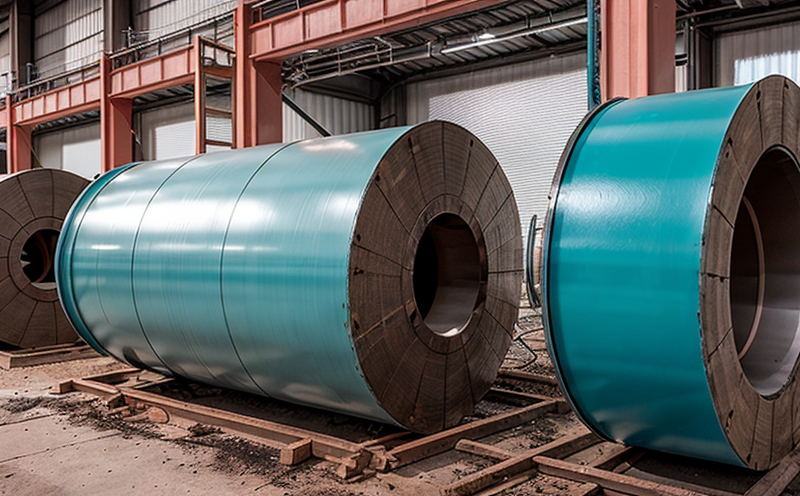Corrosion Resistance & Durability Testing in Industry
In industrial manufacturing and processing, materials are subjected to a multitude of harsh environmental conditions. Corrosion resistance and durability testing plays an essential role in ensuring the integrity and longevity of products across various sectors such as aerospace, automotive, construction, and petrochemicals.
Corrosion is one of the leading causes of material degradation and failure in industrial applications. Understanding how materials behave under corrosive conditions helps manufacturers design more resilient products that meet stringent quality standards. At Eurolab, we provide comprehensive testing services aimed at evaluating a material's resistance to corrosion and its durability over time.
Our tests simulate real-world environments where the material is likely to be used. This includes exposure chambers for atmospheric testing, salt spray chambers, and water immersion tanks among others. By subjecting specimens to controlled conditions that mimic actual operational scenarios, we can accurately assess their performance under various stressors like humidity, temperature changes, and chemical reactions.
The importance of this type of testing cannot be overstated. It ensures product reliability, reduces maintenance costs, extends service life, and enhances overall safety in industrial settings. Moreover, compliance with international standards such as ISO 12944, ASTM B637, EN 16780 further underscores the significance of these tests.
At Eurolab, we employ advanced equipment and techniques to conduct our corrosion resistance and durability assessments. Our laboratories are equipped with state-of-the-art facilities that allow us to simulate different types of corrosive environments accurately. These include:
- Airborne Salt Spray Chamber
- Water Immersion Tanks
- Solar Simulators for UV exposure
- Humidity Controlled Chambers
- Thermal Cycling Chambers
The testing process typically involves several steps, starting with the preparation of test specimens according to specific protocols. Afterward, these samples are exposed to corrosive agents or environments relevant to their intended use case. The duration and intensity of exposure depend on factors like expected lifespan and operating conditions.
Once testing is complete, our experts analyze the results using sophisticated analytical tools and techniques to determine whether the material has met required specifications regarding corrosion resistance and durability. Reporting follows internationally recognized guidelines ensuring transparency and consistency in communication about test outcomes.
Scope and Methodology
| Test Type | Description |
|---|---|
| Airborne Salt Spray Test | This method evaluates the resistance of materials to atmospheric corrosion by exposing them to a continuous stream of salt fog. It simulates conditions found near coastal areas or in industrial environments. |
| Water Immersion Test | Involves placing specimens directly into water for extended periods, often accompanied by other stressors like temperature variations. This helps identify materials susceptible to galvanic corrosion when used alongside dissimilar metals. |
| Solar Simulators | Used primarily in photovoltaic cell manufacturing but also applicable here; these devices recreate solar radiation spectra for accelerated aging studies of materials exposed to prolonged sunlight. |
| Humidity Controlled Chambers | These chambers maintain precise humidity levels, which can vary widely depending on geographical location and application. They are useful in assessing materials' susceptibility to moisture-related damage. |
The methodologies employed by Eurolab ensure that every aspect of a material's behavior under corrosive conditions is thoroughly examined. Our approach combines traditional laboratory methods with cutting-edge technologies, providing clients with reliable data and actionable insights into their product performance.
Eurolab Advantages
At Eurolab, we pride ourselves on offering world-class corrosion resistance and durability testing services. Our key advantages include:
- State-of-the-Art Facilities: Equipped with advanced instrumentation and software solutions tailored specifically for industrial applications.
- Experienced Professionals: Our team comprises highly qualified engineers who possess deep knowledge of material science, chemistry, and physics relevant to corrosion studies.
- Comprehensive Reporting: Detailed reports are provided complete with recommendations based on test findings. These documents serve as valuable resources for decision-making processes within your organization.
- ISO/IEC Accreditation: Our laboratory is ISO/IEC 17025 accredited, ensuring that all our testing procedures adhere to global best practices and standards.
We understand the critical role played by corrosion resistance and durability in industrial manufacturing. By partnering with Eurolab, you gain access to unparalleled expertise and resources designed explicitly for addressing your unique challenges related to material performance under corrosive conditions.
Use Cases and Application Examples
| Application | Description |
|---|---|
| Aerospace Components | Evaluating the durability of metallic components like bolts, nuts, and fasteners exposed to extreme temperatures and atmospheric conditions. |
| Automotive Parts | Assessing the longevity of exterior body panels and underbody systems subjected to road salt, rainwater, and UV radiation. |
| Petrochemical Equipment | Testing valves, pipelines, and storage tanks against aggressive chemicals present in oil refineries and chemical plants. |
| BUILDING MATERIALS | Evaluating cladding materials for exterior walls to ensure they can withstand exposure to harsh weather elements like rain and wind. |
- Construction Materials: Assessing concrete, metal roofing systems, and other building materials exposed to environmental factors such as sunlight, water, and freeze-thaw cycles.
- Petrochemical Industries: Evaluating the integrity of containers, pipelines, and storage tanks used in oil refineries and chemical plants subjected to corrosive chemicals and aggressive environments.
- Aerospace Industry: Testing aircraft parts like fasteners, seals, and other components exposed to extreme temperatures and atmospheric conditions.
These examples illustrate the diverse range of industries where Eurolab's corrosion resistance and durability testing services are applicable. By understanding the specific requirements of each sector, we tailor our tests accordingly to provide accurate and relevant results.





